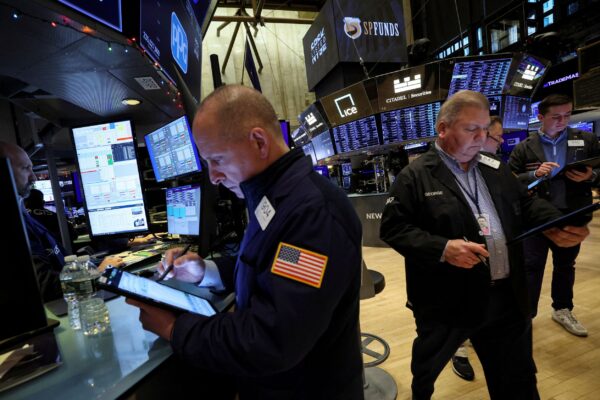Beijing Can No Longer Skirt the SEC Regulations
CommentaryThe days of a double standard for China are ending. Chinese companies will no longer be able to skirt Securities and Exchange Commission (SEC) audit rules and take advantage of American investors. There are over 250 Chinese companies listed on U.S. securities exchanges, with a combined value of over $1 trillion. They have been able to violate U.S. law until now. The Sarbanes-Oxley Act of 2002 was meant to protect American investors from investing in firms with fraudulent financial reporting. To achieve greater transparency, Sarbanes-Oxley imposes rigid recordkeeping requirements and strict rules regarding the types of accounting firms and auditors that companies can use. The behavior of corporate officers is also restricted under the act, and persons involved in falsifying the data of publicly traded companies or otherwise violating securities laws can incur criminal penalties. Firms failing to comply with audit rules can be delisted. The Sarbanes-Oxley Act gave rise to the Public Company Accounting Oversight Board (PCAOB), which serves as a watchdog for the work of auditors of publicly traded companies. There has long been a dispute between China and the United States regarding the necessity of all firms listed on U.S. exchanges to be subjected to audits and reviews of audits. The China Securities Regulatory Commission has maintained that under Chinese law, the books of Chinese firms could not be made available to foreign regulators. This year, the SEC and the U.S. government have decided that the rules apply to everyone, including firms from China. In April, the PCAOB sanctioned Chinese firms WWC PC and JLKZ CPA LLP for using unregistered Chinese auditors. A separate piece of legislation, the Holding Foreign Companies Accountable Act of 2020, requires listed companies to disclose whether or not they are owned or controlled by a foreign government, or an entity controlled by a foreign government. The danger for U.S. shareholders is that state-owned and state-controlled companies may make decisions for political rather than financial reasons. Traders work on the New York Stock Exchange (NYSE) floor in New York City on Nov. 29, 2022. (Brendan McDermid/Reuters) Companies with state or partial-state ownership often act to achieve the objectives of the Chinese Communist Party (CCP) rather than to maximize shareholder value. The ownership structure of many listed Chinese companies has gone undisclosed; however, this structure is one piece of information that would be revealed during an audit. Chinese stocks sold in the United States are fraught with irregularities and risks for U.S. investors. In November, the U.S. Financial Industry Regulatory Authority (FINRA) reported that there had been a number of “pump-and-dump” initial public offerings (IPO) of Chinese companies on Nasdaq. These schemes, involving companies worth less than $100 million, often fly under the radar of regulators. The share prices are artificially inflated through broker-dealers in Hong Kong. Complicit Chinese investors then sell the shares at a peak profit, leaving the buyers holding stocks with plunging value and no actual market. Another issue with Chinese companies is that they are often listed on U.S. exchanges under an arrangement called a variable interest entity (VIE). For example, U.S. investors believe they are purchasing shares of Alibaba. Still, they are actually buying shares of a Cayman Island corporation that has a contractual agreement to pass through the profits of Alibaba to the shareholders in the United States. VIEs are not illegal under U.S. law; the SEC believes that investors have the right to know that the company they are investing in is actually a Cayman-Island VIE and not a Chinese operating company. The Holding Foreign Companies Accountable Act and the PCAOB audits are not specifically targeting VIEs. Still, because of the large percentage of Chinese companies using VIE structures to list in the United States, these additional rules will help to disclose which companies are VIEs and provide American investors with better information to direct their investment decisions. SEC Chairman Gary Gensler stressed to the Chinese side that the PCAOB had to be granted access to the audits of Chinese firms listed on U.S. exchanges; otherwise, the firms would be delisted. About 250 Chinese companies were threatened with a possible delisting from U.S. exchanges. In August, Beijing and Washington signed a pact allowing a seven-week inspection. Audit reviews began in Hong Kong and got off to a problematic start as the Chinese side requested to be able to redact information such as the names, salaries, and addresses of executives and employees in the firms’ financial records. Eventually, the two sides reached an agreement, and work was able to proceed. In mid-November, after a seven-week inspection, the PCAOB reported that they could obtain sufficient access to review the audits of New York-listed Chinese firms

Commentary
The days of a double standard for China are ending. Chinese companies will no longer be able to skirt Securities and Exchange Commission (SEC) audit rules and take advantage of American investors.
There are over 250 Chinese companies listed on U.S. securities exchanges, with a combined value of over $1 trillion. They have been able to violate U.S. law until now. The Sarbanes-Oxley Act of 2002 was meant to protect American investors from investing in firms with fraudulent financial reporting. To achieve greater transparency, Sarbanes-Oxley imposes rigid recordkeeping requirements and strict rules regarding the types of accounting firms and auditors that companies can use. The behavior of corporate officers is also restricted under the act, and persons involved in falsifying the data of publicly traded companies or otherwise violating securities laws can incur criminal penalties. Firms failing to comply with audit rules can be delisted.
The Sarbanes-Oxley Act gave rise to the Public Company Accounting Oversight Board (PCAOB), which serves as a watchdog for the work of auditors of publicly traded companies. There has long been a dispute between China and the United States regarding the necessity of all firms listed on U.S. exchanges to be subjected to audits and reviews of audits. The China Securities Regulatory Commission has maintained that under Chinese law, the books of Chinese firms could not be made available to foreign regulators.
This year, the SEC and the U.S. government have decided that the rules apply to everyone, including firms from China. In April, the PCAOB sanctioned Chinese firms WWC PC and JLKZ CPA LLP for using unregistered Chinese auditors. A separate piece of legislation, the Holding Foreign Companies Accountable Act of 2020, requires listed companies to disclose whether or not they are owned or controlled by a foreign government, or an entity controlled by a foreign government. The danger for U.S. shareholders is that state-owned and state-controlled companies may make decisions for political rather than financial reasons.

Companies with state or partial-state ownership often act to achieve the objectives of the Chinese Communist Party (CCP) rather than to maximize shareholder value. The ownership structure of many listed Chinese companies has gone undisclosed; however, this structure is one piece of information that would be revealed during an audit.
Chinese stocks sold in the United States are fraught with irregularities and risks for U.S. investors. In November, the U.S. Financial Industry Regulatory Authority (FINRA) reported that there had been a number of “pump-and-dump” initial public offerings (IPO) of Chinese companies on Nasdaq. These schemes, involving companies worth less than $100 million, often fly under the radar of regulators. The share prices are artificially inflated through broker-dealers in Hong Kong. Complicit Chinese investors then sell the shares at a peak profit, leaving the buyers holding stocks with plunging value and no actual market.
Another issue with Chinese companies is that they are often listed on U.S. exchanges under an arrangement called a variable interest entity (VIE). For example, U.S. investors believe they are purchasing shares of Alibaba. Still, they are actually buying shares of a Cayman Island corporation that has a contractual agreement to pass through the profits of Alibaba to the shareholders in the United States. VIEs are not illegal under U.S. law; the SEC believes that investors have the right to know that the company they are investing in is actually a Cayman-Island VIE and not a Chinese operating company.
The Holding Foreign Companies Accountable Act and the PCAOB audits are not specifically targeting VIEs. Still, because of the large percentage of Chinese companies using VIE structures to list in the United States, these additional rules will help to disclose which companies are VIEs and provide American investors with better information to direct their investment decisions.
SEC Chairman Gary Gensler stressed to the Chinese side that the PCAOB had to be granted access to the audits of Chinese firms listed on U.S. exchanges; otherwise, the firms would be delisted. About 250 Chinese companies were threatened with a possible delisting from U.S. exchanges. In August, Beijing and Washington signed a pact allowing a seven-week inspection.
Audit reviews began in Hong Kong and got off to a problematic start as the Chinese side requested to be able to redact information such as the names, salaries, and addresses of executives and employees in the firms’ financial records. Eventually, the two sides reached an agreement, and work was able to proceed.
In mid-November, after a seven-week inspection, the PCAOB reported that they could obtain sufficient access to review the audits of New York-listed Chinese firms. PCAOB expects that by the end of the year, they will be able to provide at least a preliminary report on the results of the audits. Firms that fail their audits may either be delisted or given a grace period to correct the problems and meet transparency requirements.
Views expressed in this article are the opinions of the author and do not necessarily reflect the views of The Epoch Times.












